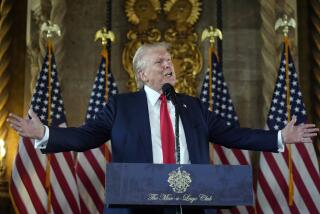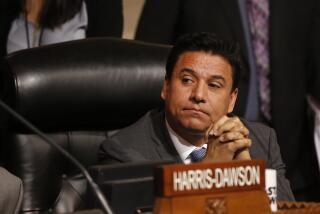Angry Judge in Montoya Case Berates Prosecution
- Share via
SACRAMENTO — Preparing to preside over the political corruption trial of Sen. Joseph B. Montoya (D-Whittier), an angry federal judge on Thursday berated prosecutors for waiting until the last minute to amend the charges against the lawmaker and his former aide, Amiel A. Jaramillo.
U.S. District Judge Milton L. Schwartz accused the U.S. attorney’s office here of being unfair to both defendants in the case when it asked for and got a revised grand jury indictment against the defendants last month, less than two months before their scheduled Dec. 4 trial.
Schwartz pointed out that prosecutors led by U.S. Atty. David F. Levi have had since August, 1988--when federal agents raided the Capitol offices of Montoya and others--to file their charges.
“After all this time, we have some new ideas, we want some more,” the judge said, referring to the revised indictment.
“If you think I’m angry, that’s such an understatement, it’s almost a lie,” he said, adding, “We are playing games, folks, and you’re not going to play games with me.”
Because of the amended indictment, Jaramillo’s attorney asked for a delay in the start-up date for the trial. But Montoya and his lawyer have repeatedly said they want the case settled so that the senator can run for reelection next year.
Schwartz complained, “I am going to have to try this case twice,” before agreeing to grant Jaramillo a delay and a separate trial. Montoya’s case will stay on a schedule.
Montoya said in a brief interview with The Times that he was anxious to get the case behind him so he can mount an effective political campaign.
“The people in my district support me,” Montoya explained. “But the opinion makers want to see how this turns out.”
Montoya and Jaramillo have been charged with a total of 16 counts of extortion, racketeering, bribery and conspiracy.
The case against Montoya centers on a $3,000 honorarium he accepted in June, 1988, from undercover FBI agents who were posing as businessmen and seeking support for special-interest bills that would benefit their phony company. The undercover agents were part of a 3 1/2-year federal sting operation called Brispec (for Bribery--Special Interest).
More to Read
Get the L.A. Times Politics newsletter
Deeply reported insights into legislation, politics and policy from Sacramento, Washington and beyond. In your inbox twice per week.
You may occasionally receive promotional content from the Los Angeles Times.









